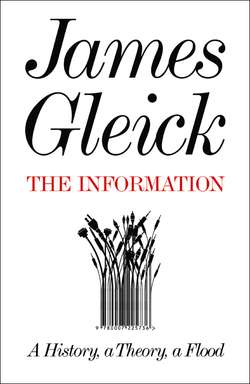The Information: A History, a Theory, a Flood

Реклама. ООО «ЛитРес», ИНН: 7719571260.
Оглавление
James Gleick. The Information: A History, a Theory, a Flood
Contents
Отрывок из книги
A History
A Theory
.....
Then the vanished world of primary orality was not much missed. Not until the twentieth century, amid a burgeoning of new media for communication, did the qualms and the nostalgia resurface. Marshall McLuhan, who became the most famous spokesman for the bygone oral culture, did so in the service of an argument for modernity. He hailed the new “electric age” not for its newness but for its return to the roots of human creativity. He saw it as a revival of the old orality. “We are in our century ‘winding the tape backward,’ ” he declared, finding his metaphorical tape in one of the newest information technologies. He constructed a series of polemical contrasts: the printed word vs. the spoken word; cold/hot; static/fluid; neutral/magical; impoverished/rich; regimented/creative; mechanical/ organic; separatist/integrative. “The alphabet is a technology of visual fragmentation and specialism,” he wrote. It leads to “a desert of classified data.” One way of framing McLuhan’s critique of print would be to say that print offers only a narrow channel of communication. The channel is linear and even fragmented. By contrast, speech—in the primal case, face-to-face human intercourse, alive with gesture and touch—engages all the senses, not just hearing. If the ideal of communication is a meeting of souls, then writing is a sad shadow of the ideal.
The same criticism was made of other constrained channels, created by later technologies—the telegraph, the telephone, radio, and e-mail. Jonathan Miller rephrases McLuhan’s argument in quasi-technical terms of information: “The larger the number of senses involved, the better the chance of transmitting a reliable copy of the sender’s mental state.”2 In the stream of words past the ear or eye, we sense not just the items one by one but their rhythms and tones, which is to say their music. We, the listener or the reader, do not hear, or read, one word at a time; we get messages in groupings small and large. Human memory being what it is, larger patterns can be grasped in writing than in sound. The eye can glance back. McLuhan considered this damaging, or at least diminishing. “Acoustic space is organic and integral,” he said, “perceived through the simultaneous interplay of all the senses; whereas ‘rational’ or pictorial space is uniform, sequential and continuous and creates a closed world with none of the rich resonance of the tribal echoland.” For McLuhan, the tribal echoland is Eden.
.....